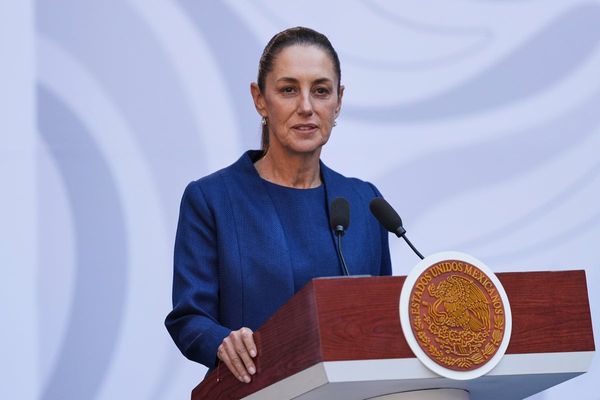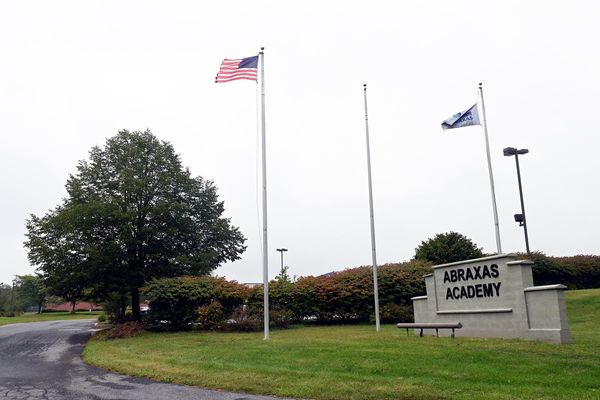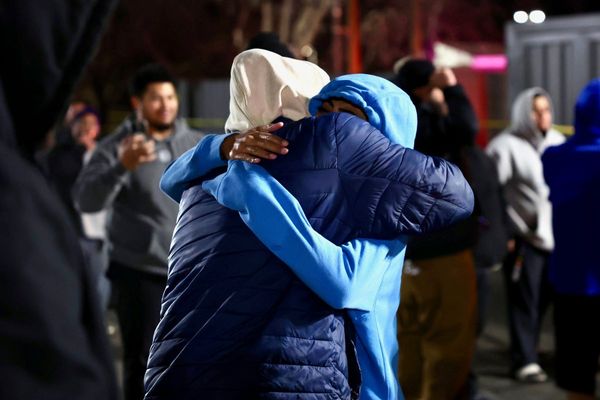
Hollywood, by nature, is a performative place. When you make it there by playing someone else on screen, and suddenly everyone wants to know the real you, you have to decide: Which version of your story do you tell?
Interviews often reveal bits and pieces of your personal life, but that can become performative, too. "I've struggled with that over the years," Lauren Graham told me on "Salon Talks." "I'm very private and if I'm going to tell something personal, how far do I go?"
That's why the actress is dedicated to telling her story, her way — always with her dry wit, and frequently through 1990s nostalgia. Graham's new collection of personal essays (her fourth book, out now) is called, "Have I Told You This Already?: Stories I Don't Want to Forget to Remember."
Before Graham landed her standout role as Lorelei Gilmore on "Gilmore Girls" more than 20 years ago and then became a familiar face on shows like "Parenthood," "Zoey's Extraordinary Playlist" and now "The Mighty Ducks: Game Changers," she was living the stories in "Have I Told You This Already?" Watch our "Salon Talks" episode here or read a Q&A of our conversation below to hear more about what her life was like before she landed her first TV role and why she frequently questions what the stories we tell ourselves mean.
The following interview has been lightly edited for clarity and length.
"Have I Told You This Already?" is your fourth book and focuses much on stories from your early career. In a way, it's your story of making it and the little moments that happened along the way. Why did you want to tell this story now?
Well, we had this little pandemic, and I needed to do something with my brain and I have celiac disease, so I couldn't make sourdough bread. It was a function of having time, but it was also a function of getting to a place in my life where I've had dear friends for so long and family members who know all my key stories, or the stories I tell myself of how one thing led to another and how I got here, and it doesn't even mainly have to do with show business. It's just the me who's here today and here are the building blocks of that.
I was particularly struck when I discovered the story that my father had been telling me about the day I was born had some complete misinformation in it. I was thinking thematically about memory and time and our ideas about ourselves. Was this story his version just because that's how he remembered it, or was the true version, the right version? Is it a good idea to be so tied to our sense of ourselves in the past? Or do you need to constantly rethink how your past, how it made you?
You write about your early career and the experience of becoming a working actor, the dream of it versus the reality. Much of that, I thought, was really universal for anyone who's a dreamer, for anyone who's envisioning a career or a goal for themselves.
When I first got to Los Angeles, in particular, because that's where I really started working, I made commercials in New York and I would get little things, little day or two on a soap or something, but once I got to LA I really started working and I can't believe how much confidence I had. It was completely unwarranted.
Actually over time, as I learned more, I almost had to recalibrate what my sense of myself was because especially in the late '90s in Los Angeles, everything was a half-hour sitcom, and those are just inherently fun, it's doing a theater, you have a live audience, I'd have these little fun parts and my first job was on "3rd Rock from the Sun" with John Lithgow and Jane Curtin and I was so excited all the time and I was living with my friend Connie Britton and she was on the sitcom "Ellen" and we just were having so much fun and then it got more complicated.
Connie [Britton] was your roommate. How did you her meet and how did you end up sharing an apartment?
We were in the same acting class in Wynn Handman's acting class in New York, which was a very incredible group of people, and Wynn was an incredible teacher and we were assigned to do a scene lifted from, or basically it was the J.D. Salinger short story, "Uncle Wiggily in Connecticut," which is two women who don't know each other that well getting drunk together.
Naturally she came to my house and we drank and tried to learn lines. So we just became friendly, and then she did this movie "Brothers McMullen," which was starting to do the festival circuit and we just didn't know anything. She was going to LA ,and I had gotten a pilot and I was going to LA, and she had this house that we could illegally stay at, and we just thought that was fantastic.
"I can't believe how much confidence I had. It was completely unwarranted."
We went to LA and we rented horrible cars and we worked a little and just had fun, and I think both of us felt that early rush of, I'm getting to do what I hoped I got to do. It didn't matter how big the part was, didn't matter what the show was; that was that first level of, "all our dreams have come true," and then of course you make new dreams once your dreams have come true.
Your sense of humor shines through in all of your writing, even in some of the darker moments, like when you write about rejection or needing your body parts to look a certain way to book in Hollywood. Do you always maintain a sense of humor?
I think luckily for me, my actual voice and my writing voice are quite aligned. I can only think in the way I would say it, and the way I tell a story is usually through a lens of, "Isn't this insane?" I don't even know that it's finding the humor, I just think that's how I've always been, and so I try to speak through my pen. I struggle with different things as a writer. I struggle with structure and plot, I would say mainly, but the voice is sort of there.
It sounds like you developed a love of storytelling just through being around your dad. You write how his stories were a part of growing up.
He would read to me at bedtime, but he was also, as I say, he had his stories that are the building blocks of his childhood that he goes back to and told to me and told to my brother and sister. I would say I come from a family of very dryly funny storytellers, on especially my dad's side of the family. I have a lot of cousins who I spent a lot of time with growing up and just the car stories alone could fill an entire book of the cars that broke down. I mentioned this in the book, we lost a car once, no one knew who had it last and where it had died on the side of the road or who towed it. I come from a good family of storytellers.
Speaking of telling stories, you write about getting booked on late-night talk shows when "Gilmore Girls" was gaining traction and the moment you learned that some of these interview shows are actually rehearsed and the stories they want you to tell about yourself are somewhat exaggerated.
That was another piece of information that no one tells you is, and of course when you think about it, these shows are delineated by commercial breaks and of course you want a story that is completed within that amount of time and sometimes a tweak will help, but what I didn't know is some people would have their writers, if they were on a half-hour show or something, they'd have their writers form their stories or they'd tweak the ending.
It caused me to question what else was not totally authentic and how I felt about [it]. Was it more important to tell the real story or was it more important to be funny on a talk show? Because sometimes in the moments where you're supposed to be the most real, which is as yourself, it feels like a lie to change the story even if it's for the impact, and I think I've struggled with that over the years. I'm very private and if I'm going to tell something personal, how far do I go? How much do I change? So I still don't really have the answer, but I'm definitely asking the question.
It's clear that writing is something you will continue to do. Is writing a way for you to cut through all of that and actually be yourself on the page?
I think so. And I think that's why, before I really thought I am also a writer and that's something I'm going to take seriously and do as another pursuit, I started asking when I'd get an article in something, can I write it? Can it be a question and answer? That they send me the questions and I write them down because I'm not always known of as or as articulate off the cuff, and I just wanted to not look at something and go, "That's not how I said it or that's not what I meant, or that feels false." I think that instinct led to what I'm sitting here talking about today, and it's not really injured by a misinterpretation necessarily, I'd just rather be the one, if I'm going to be wrong. I'd rather be wrong myself. I want to be the one to tell the story.
You write about what being camera-ready has meant to you over the years, including your love-hate relationship with health camps and why those are mostly about letting someone else have control. Can you talk a little bit about that and how that's very different than wanting to have control over what's said about you?
Well they're probably related to one another, which is, it's all public, private and it's me, but then I'm the instrument too, so I'm playing a part, but that part has my arms and my nose, the part is my self, which involves my face and body, and I, of course, [I] always knew that, but it's just quite a thing to wake up every day and worry about getting to work at six in the morning and feel like you're bloated from the sushi you ate last night. It's just like, it's always on your mind, in terms of what I do with in my personal life affects my professional life, and so there's a fatigue that can come with that.
I had a trainer once who used to say, "I'm not the dry cleaners, you can't just drop yourself off and expect to be good as new. You have to be responsible on your own too." I guess it's a way of dealing with whatever the pressure is that at times I've just thrown up my hands, I'm not always living in like, "Oh God, what do I do about myself today?" But it's there. It's there in this career and so it's just something to think about and maybe dispose of, or not think about anymore, or go to some hideous health camp. I think it's just an ever-present issue. Some people have a much easier time accepting that, or I don't know that everybody struggles, I mean there's plenty of actresses who are those people you knew in high school who were just naturally ridiculous looking and they don't have to worry about it. It's just something to think about, especially as we get older.
You recently opened another door in your career, directing. Congratulations on directing your first TV episode on "The Mighty Ducks: Game Changers." Why did you want to take that step?
I think once I luckily have been doing this a while, you just see the hole, it's not even like, "Oh, I'd like to do this different job", it's like, I am doing this already in the day, I'm seeing how we could do this scene more efficiently, I'm seeing in the eyes of another actor what I think might help the scene I know because I've observed what the crew does and how maybe we could all be collaborating in a different or in a good way.
It's another aspect of storytelling, but then you just get to be telling the bigger piece, and I think once you've done any of these jobs, which is why DP's become directors, first AD's become directors, once you see the whole, it's hard not to step into that even in your imagination and think, "I would like to do this." I think at a place, especially working with younger people, I just love them so much and I'm more interested in their day, in their work, in their growth. I am interested in lifting them up to wherever they want to go.
Somebody said to me, being an episodic television director is like being invited to somebody's house for dinner, but you were cooking dinner and you were cooking it with only the ingredients they already have, there are limitations in that work because something has been established already and you're there to serve that world, which is fantastic. I have enough careers but it'd be interesting to see what it would be like to direct a film as well, it's just a different animal.
Before you go, I have to ask you about "Gilmore Girls." You write in the book how filming the "Gilmore Girls" revisit episodes on Netflix was one of the "best, happiest, most rewarding experiences" of your career. The show is often talked about in terms of the fans and why it's important to them, but I want to know why was it important for you to play Lorelei again?
Because I got to go back to something understanding how important it was to me and to other people as well. I don't know how many times you get to do that. There was the doing of it, which was a frenzy and a certain time and you don't have perspective, and then to go back because it has been appreciated, because there is a desire for it, because people wanted more, that was something I'd never had in that way where people were so excited.
"You make new dreams once your dreams have come true."
We were so excited and we'd all grown and matured and it just felt like this collaboration. There was so much gratitude in the air and I got to have some of my friends play parts. It just was like, if you got to go to college again, but you know how to do it and you know how important all your classes are and you're like, "Give me more tests," you're just so in a different mindset of appreciation. It was just mind-blowing.
You are a Masterclass subscriber and fan of learning new things. Is there one Masterclass we all need to take? What's been your favorite?
Well, two and they're very different. Ron Howard on directing is fantastic. Not surprisingly, but not everyone who's fantastic at something is also a fantastic teacher. It's its own thing. Ron Howard's directing is so clear and so interesting and so creative and so helpful, and he breaks down scenes. It's incredible. The other one, I'm going to forget the guy's name, but is hostage negotiation, which is fascinating, and I don't know how it applies to your real life and I don't want to know, but it was just a really fascinating study of the human mind and how this person has learned to get people to do what he wanted them to do.







